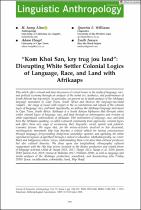| dc.identifier.citation | Alim, H. & Williams, Quentin & Haupt, Adam & Jansen, Emile. (2021). “Kom Khoi San, kry trug jou land”: Disrupting White Settler Colonial Logics of Language, Race, and Land with Afrikaaps. Journal of Linguistic Anthropology. 31. 194-217. 10.1111/jola.12308. | en_US |
| dc.description.abstract | This article offers a broad and deep discussion of critical issues in the study of language, race, and political economy through an analysis of the verbal art, aesthetics, and performances of South African hip hop artists. In particular, we present an in-depth analysis of the Afrikaaps language movement in Cape Town, South Africa and theorize the language-race-land complex, the range of issues with respect to the co-constitution and refusal of the colonial logics of language, race, and land. Specifically, we address the Afrikaaps language movement in Cape Town, South Africa. Afrikaaps is a South African hiphopera that disrupts white settler colonial logics of language, race, and land through an interrogation and revision of white supremacist constructions of Afrikaans. This reinvention of language, race, and land frees the Afrikaans-speaking, so-called Coloured community from oppressive, colonial logics and offers them new ways of envisioning their linguistic, racial, spatial, and political-economic futures. We argue that, for the artists–activists involved in this decolonial, raciolinguistic movement, Hip Hop becomes a critical vehicle for raising consciousness through language, foregrounding Indigenous knowledge systems, and upending the white supremacist legacies of apartheid through a radical re-education. Methodologically, we center Black and Indigenous artists’ voices, understanding them to be more than cultural producers but also cultural theorists. We draw upon our longitudinal, ethnographic cultural engagement with the Hip Hop artists involved in the theatre production and related forms of language activism (Alim & Haupt 2015, 2017; Haupt 2012; Haupt et al. 2019; Jansen 2019; Jansen et al. 2019; Stroud & Williams 2017; Williams 2018), as well as language and media analyses of the Afrikaaps production, soundtrack, and documentary film (Valley 2010). © 2021 American Anthropological Association | en_US |

